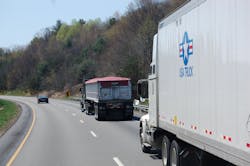Speed limiting remains contentious trucking issue
Mandating speed-limiting technology for commercial vehicles remains a hotly contested issue in the trucking industry, with one trade group calling for a 65 mph limit while another insists no such limits should be set at all without similar rules for all motorists.
On the one hand, the American Trucking Associations (ATA) wants the U.S. Department of Transportation (DOT) to move forward with a rule requiring electronic speed limiters for all large trucks and the limits for those devices to be set no higher than 65 mph.
“We waited patiently until the government finally said in January 2011 they would move ahead with a speed limiter mandate, but this commonsense regulation has been mired in bureaucracy for over four years now,” noted Bill Graves, ATA’s president and CEO, in a statement. "It is long past time for the National Highway Traffic Safety Administration (NHTSA) and the Federal Motor Carrier Safety Administration (FMCSA) to move ahead with this rule.”
Yet the Owner-Operator Independent Drivers Association (OOIDA) cautions that mandating a set speed limit for commercial vehicles without a similar imitative for other motorists could actually be problematic.
“Traffic is safest when vehicles travel at the same relative speed,” Norita Taylor, OOIDA’s spokeswoman, told American Trucker magazine, Fleet Owner’s media sibling.
“Speed limited trucks on highways mean rolling road blocks that create congestion and increase the likelihood for collisions,” she added.
That’s one reason why Graves stressed that ATA actually wants to slow all highway traffic down, not just trucks.
“That’s why we back a national speed limit for all vehicles of 65 mph and are disturbed by the recent trend of states raising their speed limits to 70, 75, 80 mph or in some areas even 85 mph,” he emphasized. “Those limits are reckless and are needlessly endangering millions of motorists.”
Nationally, ATA said speed is a cause or factor in nearly 30% of all fatal crashes, with driving too fast for conditions or over the posted speed limit the primary reason for 18% of all fatal crashes where a large truck was deemed at fault.
